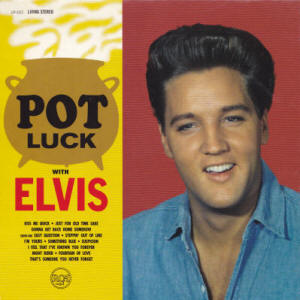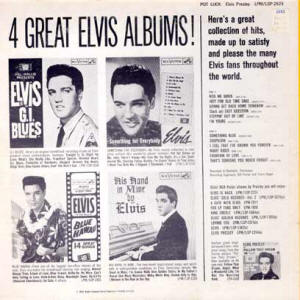

On June 5, 1962 RCA Victor released "Pot Luck
With Elvis", which was quite astonishing because
the soundtrack album "Blue Hawaii" was still in
the top 20 of Billboards "Top LPs Chart". The
new longplayer entered the hitparade on July
14th, had a run of 31 weeks and peaked at number
4. In West-Germany (at the time the country was
devided) "Pot Luck With Elvis" reached number 7
of the charts and in Great Britain it even
became a number one hit. In its initial sales
period the album sold 300,000 units, in total
RCA Victor was able to retail 2.75 million
copies. This translates to 412.5 million paid
streams of the complete album or 4.13 billion
paid streams of individual tracks. The
comparably low sales obviously were homemade,
because a lot of fans had to decide to buy
either "Blue Hawaii" or "Pot Luck With Elvis".
In 2016 the complete Presley catalogue was
restored and remastered by Vic Anesini for a
boxed set of 60 compact discs called "The Album
Collection". Sony Music Entertainment provides
the streaming platforms with the same versions
of the individual albums (some of them offering
bonus tracks), albeit in 24 bit/90 khz flac.
That means, if the platform of your choice
supports high resolution audio, you can enjoy
the tracks in the same quality Sony used to scan
and master them. On Spotify, which has a market
share of approximately 30% and is the only
platform that publishes streaming figures, "Pot
Luck With Elvis" accumulates 30 million streams
and is requested 15,000 times per day. So
nowadays the longplayer has overtaken "Something
For Everybody", but isn't all that popular
amongst the fans.
The front cover showed the king with
open-necked shirt and piled up, undyed hair, the
backside of the sleeve was used to promote the
four latest albums of Elvis as well as the
soundtrack ep to "Follow That Dream". If you
compare the covers of the album and the
aforementioned extended player, it's easy to see
that both photos were made on the same occasion.
In contrast to "Elvis Is Back" (1960) and
"Something For Everybody" (1961) the new
longplayer wasn't produced in one go. It's a
compilation of recordings Elvis made in 1961 and
1962 at RCA Studio B in Nashville/Tennessee. All
these sessions were produced by Steve Sholes and
engineered by Bill Porter. The only exception
was "Steppin' Out Of Line". This track had been
recorded for the movie "Blue Hawaii" at Radio
Recorders in Hollywood/California under the
supervision of Joseph Lilley. The guitarists of
the different sessions were Scotty Moore, Hank
Garland, Neal Matthews, Jerry Kennedy, Harold
Bradley and Grady Martin. The drums were shared
by D.J. Fontana and Murrey Harman, Bob Moore was
on bass and Floyd Cramer played piano and organ.
Occasionally Gordon Stoker also played piano and
accordion. Saxophone and vibraphone were played
by Homer Randolph. The harmony vocals were
provided by The Jordanaires (Gordon Stoker, Hoyt
Hawkins, Neal Matthews and Ray Walker) as well
as Millie Kirkham. In total "Pot Luck With
Elvis" has a running time of 28:11 minutes.
In 2007 Follow That Dream Records released a
collector's edition of the longplayer. For a
review, just tap
HERE.
In 2021 Sony's own collector's label followed up
with "The POT LUCK Sessions". The review can be
found
HERE.
Kiss Me QuickDoc Pomus and
Mort Shuman had written "Kiss Me Quick" for The
Flamingos, who rejected the song. Mort Shuman
once said, that "Kiss Me Quick" was his worst
song and he wondered why Elvis recorded it. In
contrast to the writer I like the song very
much. It's fluffy, dancable radio-popmusic. The
people at RCA thought similarly and released it
on singles in serveral countries. In Great
Britain "Kiss Me Quick" / "Something Blue"
peaked at number 14, in West-Germany "Kiss Me
Quick" / "Night Rider" made it to number 3 of
the charts. In Belgium, Norway and Denmark "Kiss
Me Quick" became a top 5 hit. In the US it took
RCA until 1965 to release the track on a single,
but by now the music taste had changed, the song
stagnated at number 34 of the "Hot 100" and sold
just 500,000 copies. By the way: "Kiss Me Quick"
was recorded on June 25, 1961. The 12th take
became the master.
Just For Old Times Sake
With this ballad the singer begs his
ex-girlfriend to take him back. Elvis performs
the song with much emotion and in a very
believable way. He recorded "Just For Old Times
Sake" on March 18, 1962 within 5 takes. In 1969
NBC/Universal considered the composition of Sid
Tepper and Roy C. Bennet for "Change Of Habit",
but finally decided to record a new,
contemporary soundtrack.
Gonna Get Back Home Somehow
According to Mort Shuman, who wrote the song
together with Doc Pomus, "Gonna Get Back Home
Somehow" was influenced by Hank Williams'
"Ramblin' Man". Elvis recorded the fast popsong
on March 18, 1962 and approved the 7th attempt
for release. He performed the tune with a touch
of blues in his voice, which I like very much.
(Such An) Easy Question
The singer asks a girl if she was in love with
him and regards it an easy question. On March
18, 1962 five takes were enough to record the
felicitous popsong by Otis Blackwell and
Winfield Scott. In 1965 Allied Artists used
"(Such An) Easy Question" in the movie "Tickle
Me", which lead RCA Victor to release the track
on a single. Even though the song was available
for 3 years at the time, the record made it up
to number 11 on the "Hot 100" and even became a
number 1 hit on the "Easy Listening Chart".
Worldwide the single sold a million copies,
which translates to 150 million paid streams.
Steppin' Out Of Line
The name fits well, because this is the only
song that wasn't recorded at RCA Studio B in
Nashville/Tennessee. Besides that there is some
minor distortion audible. Elvis taped "Steppin'
Out Of Line" on March 22, 1961 at Radio
Recorders in Hollywood/California for the movie
"Blue Hawaii". He recorded 19 takes and selected
the 17th one for release. Because the song was
neither used in the movie, nor on the soundtrack
album it was decided to put it on "Pot Luck With
Elvis". Colonel Parker hated to file away a
recording, because it had costed money to make
and wasn't able to earn anything back if it
stayed in the vaults. His client either thought
in a similar way or simply didn't care, because
otherwise he wouldn't have approved the release.
I'm Yours
This ballad is the most complex production on
"Pot Luck With Elvis". On June 26, 1961 Elvis
recorded six takes of the song, two
workpart-takes as well as six takes of his
harmony voice and the spoken part. The master
was a splice of take 6 and workpart-take 2 as
well as take 5 (spoken part) and take 6 (harmony
vocal). Elvis promises eternal love and does it
in dazzling romantic style. The song itself is
very good, which isn't a surprise, because it
was written by Don Robertson. "I'm Yours" was
also used for the movie "Tickle Me" and
re-released by RCA Victor on a single, too. The
45 also peaked at number 11 on the "Hot 100",
became a number one hit on the "Easy Listening
Chart" and sold a million copies (which
translates to 150 million paid streams). The
version in the movie and on the single neither
featured the harmony vocal, nor the spoken part.
It's not clear if this was done on purpose or by
mistake.
Something Blue
To me "Something Blue" is the highlight of the
album. The singer has to witness his loved one
marrying someone else and alludes in several
variations to the saying "something old,
something new, something borrowed, something
blue". Elvis performs extremely well, his
sadness and disappointment are almost tangible.
"Something Blue" was written by Paul Evans and
Al Byron. On March 18, 1962 the king needed
seven takes to record this beauty. .
Suspicion
Doc Pomus and Mort Shuman wrote this popsong in
Mediterranean sytle, in which the narrator
voices his jealousy to his girlfriend. On March
19, 1962 Elvis recorded five takes and three
workpart-takes, the master is a splice of take 5
and workpart-take 3. Two years after the release
of "Pot Luck With Elvis" Terry Stafford covered
the song and scored a top 5 hit. RCA Victor
tried to jump on the bandwagon and released the
king's version, too. At the time the strategy
didn't work out at all, but in 1976 Elvis'
recording was released on a single in Great
Britain and peaked at number 9 of the UK Charts.
I Feel That I've Known You Forever
Elvis recorded the song on March 19, 1962 within
five takes. To me this is one of the highlights
of this album, because the king almost seems to
loose himself in his performance. "I Feel That
I've Known You Forever" was written by Doc Pomus
and Alan Jeffreys. This song was also used in
"Tickle Me" and was re-released by RCA Victor,
even though this time just on the soundtrack ep.
It is said that just the music of take 5 was
used and Elvis recorded a new vocal track on
October 6, 1964 at the Paramount Sound Stage.
Night Rider
This one was also used for "Tickle Me" and
therefore re-released by RCA Victor on the
accordant soundtrack. The king recorded "Night
Rider" on October 15, 1961 and approved take 3
for release. Later he revoked his decision,
recorded the song again on March 18, 1962 and
selected the 5th attempt as master. Finally he
made up his mind once more and went for the
first version. The writers are Doc Pomus
and Mort Shuman. It's a good, uptempo popsong.
Fountain Of Love
This great piece of easy listening was written
by Bill Giant and Jeff Lewis and recorded by
Elvis on March 18, 1962 within 10 takes. Today
"Fountain Of Love" is often overlooked, but to
me it's 2:13 minutes of pure relaxation.
That's Someone You'll Never Forget
Because Elvis came up with the title, he is
credited as one of the authors. However,
nevertheless the song was written by Red West.
It can be regarded a love song, but in fact the
king was commemorating his mother. Elvis sings
with a lot of emotion and it's obvious, that the
song means something to him. He taped "That's
Someone You'll Never Forget" on July 25, 1961
and needed eight takes to get it right.
Surprisingly RCA Victor re-released the track in
1967 on the b-side of "Long Legged Girl (With
The Short Dress On)".
Verdict
This album is a collection of brillant
popsongs (some of them with Mediterranean
touch), performed with class by an artist in
perfect voice. It would take Elvis until
1967, before he came up with another studio
album of this quality.

(C) RCA Records
![]()

